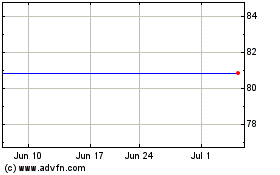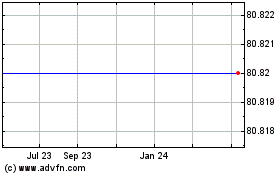St. Jude Medical Announces Expanded European CE Mark to Include Therapy Cool Path Bi-Directional Irrigated Ablation Catheter; U.
May 08 2007 - 4:05PM
Business Wire
St. Jude Medical, Inc. (NYSE:STJ) today announced expanded European
CE Mark approval to include the Therapy� Cool Path� irrigated
ablation catheter with bi-directional steering for use in ablation
procedures to treat abnormal heart rhythms. This catheter is the
first open-irrigated ablation catheter to provide bi-directional
steering, a feature designed to help physicians maneuver the
catheter in difficult areas of the heart and perform complex
ablations more efficiently. �The main advantage of the
bi-directional catheter is its ease of use in reaching difficult
anatomical locations,� said Carlo Pappone, M.D., Ph.D., F.A.C.C.,
director of the Arrhythmology Department at San Raffaele University
Hospital in Milan. �Because the catheter requires less manipulation
and provides for greater simplicity of navigation, my procedural
time was improved by about 20 percent.� �We are excited to offer
physicians the first bi-directional, open-irrigated catheter in the
European market,� said Peter Chen, president of Irvine Biomedical,
Inc., a St. Jude Medical Company. �As the population ages, the
demand for more effective treatment of cardiac arrhythmias will
only increase.� St. Jude Medical also announced U.S. Food and Drug
Administration (FDA) approval and release of the uni-directional
Therapy� Cool Path� open-irrigated ablation catheter for use in
patients with type 1 atrial flutter. With atrial flutter, the
heart�s upper chambers beat steadily faster than normal, often
resulting in a feeling of lightheadedness. Catheter ablation
therapy is used by physicians to restore a normal heart rhythm in
patients with cardiac arrhythmias. During the procedure, an
electrophysiologist uses a catheter (a long narrow tube) to deliver
radiofrequency energy to create lesions in specific areas of
cardiac tissue. The lesions, or tiny scars, interrupt the abnormal
electrical signals that contribute to erratic heart rhythms. An
open-irrigated catheter distributes saline fluid into heart tissue
through ports in the tip of the catheter to enhance cooling during
ablation procedures. Cooling the tip of the catheter is designed to
reduce the risk of undesirable tissue damage at the procedure site.
Studies have shown that open-irrigated catheters safely and
effectively create deeper and larger lesions while using less
energy than standard therapy catheters. "We are pleased to expand
and enhance our U.S. electrophysiology portfolio," said Michael T.
Rousseau, president of St. Jude Medical's U.S. Division. "These
products broaden St. Jude Medical's EP catheter and ablation system
offerings, reflecting the Company's commitment to develop
industry-leading technologies for treating many cardiac
arrhythmias." St. Jude Medical�s electrophysiology offerings
include introducers, diagnostic catheters and cardiac mapping
systems. The Therapy Cool Path irrigated catheters work in
conjunction with St. Jude Medical�s EnSite� System, a
computer-based visualization technology that provides physicians
three-dimensional graphical images of the heart and the location of
the arrhythmia's origin, enabling them to navigate
electrophysiology catheters in real time. About St. Jude Medical
St. Jude Medical is dedicated to making life better for cardiac,
neurological and chronic pain patients worldwide through excellence
in medical device technology and services. The Company has five
major focus areas that include: cardiac rhythm management, atrial
fibrillation, cardiac surgery, cardiology and
neuromodulation.�Headquartered in St. Paul, Minn., St. Jude Medical
employs more than 11,000 people worldwide. For more information,
please visit www.sjm.com. Forward-Looking Statements This news
release contains forward-looking statements within the meaning of
the Private Securities Litigation Reform Act of 1995 that involve
risks and uncertainties. Such forward-looking statements include
the expectations, plans and prospects for the Company, including
potential clinical successes, anticipated regulatory approvals and
future product launches, and projected revenues, margins, earnings,
and market shares. The statements made by the Company are based
upon management�s current expectations and are subject to certain
risks and uncertainties that could cause actual results to differ
materially from those described in the forward-looking statements.
These risks and uncertainties include market conditions and other
factors beyond the Company�s control and the risk factors and other
cautionary statements described in the Company�s filings with the
SEC, including those described in the Company�s Annual Report on
Form 10-K filed on February 28, 2007 (see Item 1A on pages 13-20,
and page 20 of Exhibit 13 to the Company�s Form 10-K). The Company
does not intend to update these statements and undertakes no duty
to any person to provide any such update under any circumstance.
SJM (NYSE:STJ)
Historical Stock Chart
From Oct 2024 to Nov 2024

SJM (NYSE:STJ)
Historical Stock Chart
From Nov 2023 to Nov 2024
